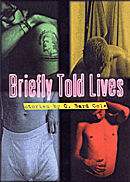|
|
||||||||
| Excerpts: | ||||||||
|

![]()

 "The Mother," Part
Two
"The Mother," Part
Two
By C. Bard Cole
From Briefly Told Lives
I slammed the door behind me and walked straight to Stewart's building. He wasn't home so I took the subway to Grand Central, caught the next train to Bronxville and found Chase and Shelby. They'd just started going out, but acted, as I'd expect from Chase, like an old married couple. I left a message on Stewart's machine and went with Chase and Shelby to the Tap, the old-person's German restaurant they'd started to frequent in my absence. Then we went to a kind of yuppie sports bar over the hill and had beer and potato skins. I slept on Chase's floor, roused the next day by Stewart, who'd driven up to Bronxville and stayed with his parents to find me. He took me back to their house, Tudor-style like all the Pondfield Avenue "cottages," a picturesque front of half-timber, patterned brick and sloping slate roofs masking its enormous three-storied bulk. It was furnished as cleanly and impersonally as a small hotel. The only one home was their housekeeper, who let Stewart kiss her cheek and indifferently prepared us sandwiches. Stewart wasn't racist, he'd said once before, because he loved Maddie more than his own mother, and he used to horse around with her son when they were both little kids.
I took a shower, changed into a pair of khakis, an Armani T-shirt, and a navy blue V-neck cotton sweater with a country club emblem of an Indian chief's head with the word "Siwanoy" below it, embroidered on the chest. I told Stewart I came out to my brother and he asked how it went. I said fine. He said he'd told his parents once, when he was fifteen, at the dinner table but they'd never mentioned it since. "I guess they know," he remarked, surveying my outfit, entirely from his closet. "Or else they think I just run through best friends."
I played with his dog, a yellow lab, out in the side yard while Stewart got his clothes out of the dryer. "Maddy says," he reported, "'You don't live her, you ain't bringing me a barrel of clothes from that college of yours, you gonna do that wash yourself." When I'd been playing for a while, dog slobber on the country-club sweater, a big black car turned into the driveway. I inched closer to the house but no one came out to save me. The boatlike Mercedes came to a full stop, its engine humming prettily for a moment. Then it fell silent, its heavy door swung open: a lady stepped out.
It was Jacqueline Onassis, I realized. Was Stewart's mother. The camel overcoat, the shiny leather gloves, the sunglasses, the scarf tied over a helmetlike hairdo. The face was a little different, I'll admit, but otherwise it was Jackie O.
"Oh, hello?" she waved as I stepped forward, speaking in a clipped, nasal voice, polite and impervious. "You must be Stewart's friend. I have some groceries in the trunk if you wouldn't mind helping me with them."
The back of the car had sprung open by itself, it seemed. There was one small bag of groceries, some flowers, and a cardboard case of wine bottles nestled down in there. I figured the box of wine would be the gracious thing to carry for her. I gathered that's what she expected.
"Where are you from?" she asked. I said Baltimore, though I figured she wanted a different explanation than that.
"Stewart's father is from Baltimore," she said. I knew that. There's one financial institution of international note in Baltimore, and it bears Stewart's last name, a fairly common one but Stewart had told me already. His father had grown up in a town house on Mt. Vernon Place, the fanciest square in town, a cluster of New York-sized urban palaces grouped around the towering Washington Monument. Grown up there, Stewart had said, and at an estate on Long Island, and a house in Eton Square in London; then a British boarding school, then Oxford and Harvard. I assumed his father's accent wasn't much like mine.
Only one mother-suitable story popped into my head to give me conversation to offer. While she opened the front door for me, I told her how Stewart and I had been walking down Mercer Street, near the faculty apartments for NYU, and had seen a fat lady walking a chocolate lab. Stewart elbowed me, said, "Look, there's a brown Caesar dog" – his yellow lab's name was Caesar; Caesar was running around between us as I followed her through the foyer – and the lady looked up at us with a broad smile, delighted, and declared, "Yes. Why, yes it is."
Stewart's mother set the flowers down on the kitchen table, took off her driving gloves, undid the scarf knotted under her chin. "That's weird," she said tonelessly. "What do you suppose she meant?"
She ruined the fucking story. She was supposed to laugh, say, "how peculiar," and let it go. As it was, she seemed neither amused nor chagrined. It was extremely disconcerting.
"I don't know," I said, grasping at straws to continue. "Either she misheard us," I sighed, "or she was just pleased by the attention."
Stewart came up the back stairs with a folded pile of laundry, trailing a faint smell that mixed fabric softener and marijuana smoke. "Hello," his mother said, unwrapping the flowers from their plastic and placing them, bunch by bunch, in one of the sinks. "Your friend was just telling me a funny story about the dog. We're having your aunt Susan and uncle Richard over tonight. If you're going to stay you'll have to get your own dinner."
"That's okay," Stewart said, leaving the laundry on a chair. "We're going back in a little bit. I just have to put this in a bag." Stewart went back downstairs to fetch his laundry sack.
"You'll have to excuse me," Stewart's mother said. "I have to start getting ready for dinner."
She didn't leave the room, though. She just turned her back to me, took a glass vase down off a shelf and began rinsing it with water under the kitchen faucet. Filling it partway and swirling to clean the dust out. Stewart came up with his bag, shoved his folded clothes into it. He kissed his mother on the cheek, told her that Caesar was getting too fat and to tell Maddy good-bye and to stop feeding him so much, grabbed my arm and walked me out to his car.
"My mom really liked you," he said, looking out the back window to keep his distance from his mother's Mercedes.
"You think?" I said. The car bumped over the stone edge of a flower bed.
"Shit," he said, red-eyed. "I hope nobody saw that." The little Honda chugged out onto Pondfield Road. "Definitely. If she hadn't liked you, you'd know it."
Rich people scared the fuck out of me, I decided. At first I thought it was just because I wasn't one of them. Daniel called me from Boston some time after that. He was back living with his dad and stepmom, working at a movie theater with a cute punk boy he wanted to seduce. "God, you met The Mother," he exclaimed. "I'm jealous. I never got to meet The Mother."
Copyright ©
2000 C. Bard Cole.
 Back
to the Stonewall Inn
Back
to the Stonewall Inn
